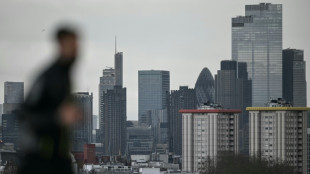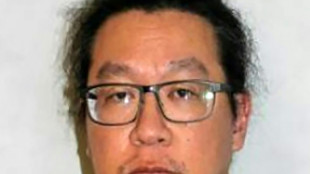
UK launches first sanctions in new strategy to deter migrant crossings

The UK imposed sanctions Wednesday on more than two dozen people, groups and suppliers from the Balkans, the Middle East and China accused of helping migrants cross the Channel.
In what it called a "landmark" first use of new powers, the move came as the government faces political pressure to stem migrant arrivals on small boats from northern France, at record levels.
The asset freezes and travel bans announced target individuals and entities "driving irregular migration to the UK", and include four "gangs" and "gangland bosses" operating in the Balkans, the Foreign Office said.
They also hit a small boat supplier in China, so-called "hawala" money movers in the Middle East, and seven alleged people-smugglers linked to Iraq.
Foreign Secretary David Lammy called it "a landmark moment in the government's work to tackle organised immigration crime" impacting the UK.
"From Europe to Asia we are taking the fight to the people-smugglers who enable irregular migration, targeting them wherever they are in the world," he added.
"My message to the gangs who callously risk vulnerable lives for profit is this: we know who you are, and we will work with our partners around the world to hold you to account."
- 'Terrorising refugees' -
Prime Minister Keir Starmer took office a year ago promising to curb the journeys by "smashing the gangs" that facilitate the crossings, but he has struggled to deliver.
Nearly 24,000 migrants have made the perilous journey across the Channel so far in 2025, the highest ever tally at this point in a year.
The issue has become politically perilous in the UK, blamed for helping to fuel the rise of the far-right and violence at anti-migrant demonstrations.
Protests have erupted sporadically outside hotels believed to house asylum-seekers, with a recent demonstration outside one in Epping, east of London, descending into clashes that injured eight police officers.
Riots sparked by the stabbing to death of three young girls in northwestern Southport a year ago also saw suspected asylum-seeker hotels attacked and anti-migrant sentiment on display.
As part of its strategy to curb new arrivals, the government is also cracking down on illegal working, which European neighbours cite as a "pull factor" for UK-bound migrants.
It announced late Tuesday a new agreement with delivery firms Deliveroo, Just Eat and Uber Eats which includes sharing the locations of asylum hotels to help tackle illegal working.
Meanwhile in another new tactic, artificial intelligence technology will be trialled to assess disputed ages of asylum-seekers who claim to be children, the interior ministry said Tuesday.
- 'Far-fetched' -
Wednesday's designations represent the UK's first use of its new "Global Irregular Migration Sanctions Regime".
It claims the regime is a "world first", empowering the Foreign Office to target foreign financiers and companies as well as individuals allegedly involved in facilitating people-smuggling to the UK.
In all, it sanctioned 20 individuals, four gangs -- two Balkan groups and two of North African origin operating in the Balkans -- and Chinese firm Weihai Yamar Outdoor Product Co.
It has advertised its small boats online "explicitly for the purpose of people-smuggling," the Foreign Office said.
Among those facing curbs was Bledar Lala, described as an Albanian controlling "the 'Belgium operations' of an organised criminal group" involved in the crossings.
The UK also targeted Alen Basil, a former police translator it accused of now leading a large smuggling network in Serbia, "terrorising refugees, with the aid of corrupt policemen".
London hit alleged "gangland boss" Mohammed Tetwani with sanctions, noting he was dubbed the "King of Horgos" over his brutal running of a migrant camp in the Serbian town Horgos.
Author and researcher Tom Keatinge, of the Royal United Services Institute (RUSI), said the sanctions were "a new front in the UK's efforts to control a business model that brings profit to the enablers" and misery to victims.
"However, I would caution against overpromising," he told AFP. "Talk of freezing assets and using sanctions to 'smash the gangs' seems far-fetched and remains to be seen.
"History suggests that such assertions hold governments hostage to fortune."
F.Cabrera--HdM

 London
London

 Manchester
Manchester
 Glasgow
Glasgow
 Dublin
Dublin
 Belfast
Belfast
 Washington
Washington
 Denver
Denver
 Atlanta
Atlanta
 Dallas
Dallas
 Houston Texas
Houston Texas
 New Orleans
New Orleans
 El Paso
El Paso
 Phoenix
Phoenix
 Los Angeles
Los Angeles



